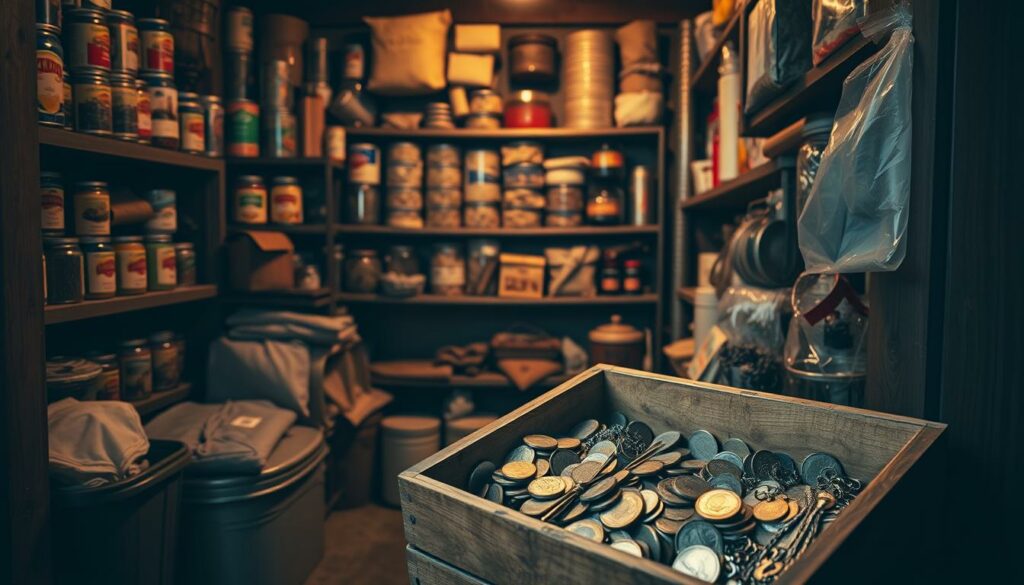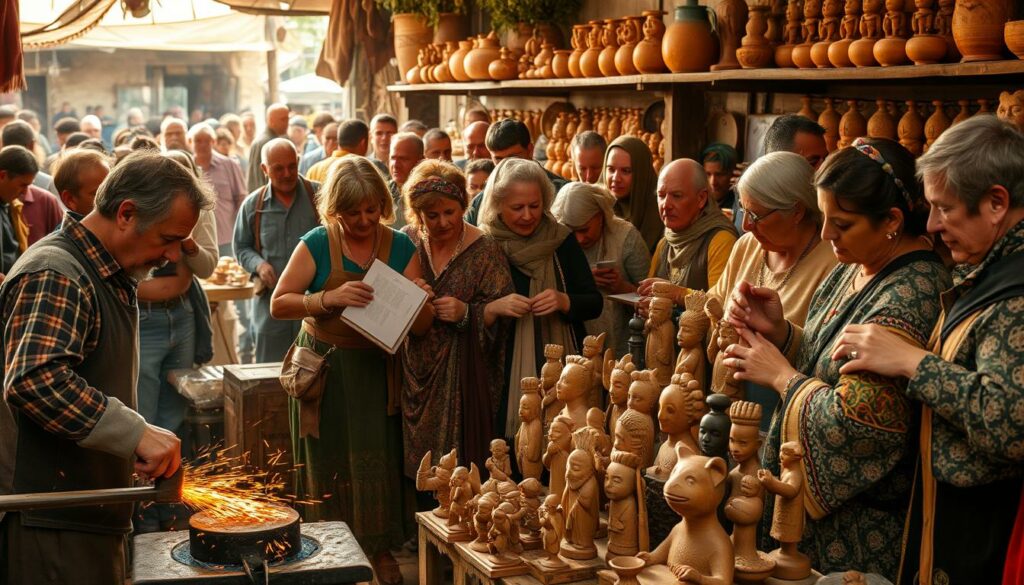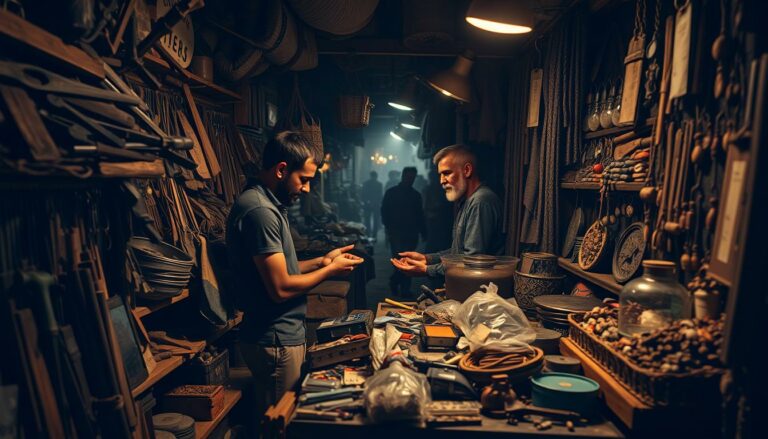When money’s value drops due to economic troubles or disasters, bartering is key. Knowing the bartering basics and what’s in demand can help you get by. This guide covers economic survival skills, including essential items and skills for trading well when money’s not an option.
Bartering lets you get what you need without using cash. Things like canned food, batteries, and medical supplies are valuable in tough times. Skills like preserving food, giving first aid, and fixing things are also very useful when services are hard to find.
Key Takeaways
- Bartering is vital when money’s not worth much.
- Items like water, food, medical supplies, and tools are in high demand.
- Items that can be used in many ways, like cooking pots and lighters, are valuable.
- Building trust and being good at negotiating are key to successful bartering.
- It’s important to stay safe during bartering to avoid risks.
Understanding Bartering: An Essential Survival Skill
In tough times, money might not be available or reliable. That’s when bartering becomes key. It’s about trading things directly without money, focusing on what’s useful and fair for both sides.
What is Bartering?
Bartering is an old way of trading goods or services without money. It’s useful when money is hard to come by. For example, you might trade food for medical supplies or tools for water filters. Learning bartering helps you be self-sufficient when money isn’t an option.
The Importance of Bartering in Survival Scenarios
In survival situations, things like clean water and first aid kits are more important than money. Being able to trade skills, like medical knowledge for food preservation, is vital. Bartering builds trust, shares resources, and is often more reliable than money.
- Food and Water: Ready-to-eat meals, jerky, and water purification tablets are prime barter items.
- Medical Supplies: Items like Ibuprofen and first aid kits are very valuable.
- Tools and Gear: Multi-tools and fire starters are essential for survival.
- Luxury Items: Things like quality coffee and dark chocolate offer comfort and normalcy.
| Items | Barter Value |
|---|---|
| Portable Water Filters | High |
| First Aid Kits | Very High |
| Multi-Tools | High |
| Premium Coffee | Moderate |
| Insulated Clothing | High |
Learning about bartering is critical for being ready for emergencies. Knowing what’s in demand and how to negotiate and build trust can make you better at bartering. It’s a vital skill for survival.
Key Items for Bartering: What’s in Demand?
In an unpredictable trade economy, having the right items can make a big difference. Knowing which items are most valuable is key.
Essential Goods
Essential goods are highly sought after because they are needed in emergencies. Canned goods are valuable because they last a long time. Dehydrated or freeze-dried food is also popular for its light weight and long shelf life.
Bottled water is a must-have, with 20% of trades involving it. Water purification tablets can increase trading value by over 30% in areas without clean water. Seeds for gardening also see a 40-60% increase in value during emergencies.
Long-Lasting Tools and Equipment
Long-lasting tools and equipment are essential. Multi-tools and knives are valuable for their versatility, increasing in value by 50% during trades. Fishing gear, which helps find food, can increase in value by over 60%.
Cooking utensils and portable stoves see a 30% demand increase when traditional cooking is not possible. These tools are vital for survival, making them highly sought after.
Luxury Items
Luxury items, like coffee, tobacco, and alcohol, are surprisingly important in bartering. They boost morale and provide comfort. Coffee and tea can exceed 50% in trade value because of their popularity.
Cigarettes or tobacco can more than double in value in high-demand situations. These items show the importance of comfort and normalcy in tough times.
| Category | Item | Value Increase |
|---|---|---|
| Essential Goods | Dehydrated/Food | 30-50% |
| Essential Goods | Bottled Water | 20% |
| Tools & Equipment | Multi-Tools/Knives | 50% |
| Tools & Equipment | Fishing Gear | 60% |
| Luxury Items | Coffee/Tea | 50% |
| Luxury Items | Cigarettes/Tobacco | 100% |
Stockpiling Barter Items: What to Consider
Stockpiling barter items needs a smart plan. Focus on items everyone needs and those that are valuable in trades.

Food and Water
Having a steady supply of non-perishable food and clean water is key. Choose foods like MREs and protein bars that last long. Also, water filters and purification systems are vital for survival.
Medical Supplies
Medical supplies are essential in any survival kit. Include bandages, pain relievers, and antibiotics. These items are rare in emergencies, making them very valuable for trading.
Personal Hygiene Items
Personal hygiene items are often forgotten but are very important. Keep basics like soap, toothpaste, and sanitary products on hand. They help keep you healthy and boost morale, even in tough times.
| Item Category | Example Items | Reasons for High Barter Value |
|---|---|---|
| Food and Water | MREs, Protein Bars, Water Filters | Long shelf life, essential for survival |
| Medical Supplies | Bandages, Pain Relievers, Antibiotics | Scarcity in crises, high demand |
| Personal Hygiene | Soap, Toothpaste, Sanitary Products | Essential for health and disease prevention |
Understanding the importance of these items helps you stockpile better. The secret to good bartering is picking and keeping items that are always wanted.
Bartering Essentials for Survival Situations
In times of crisis, knowing how to barter is key. The right items can mean the difference between having enough and going without. Certain goods and techniques can make your trades more effective.
Food is always in demand during bartering. Non-perishable items like rice, beans, and sugar are often sought after. It’s important to trade perishable items only when you have too much.
Medical supplies, like ibuprofen and aspirin, are very valuable. They make up about 65% of trades. First aid kits and other medical items are also important when money is not an option.
Tools and equipment are also highly valued, making up 60% of trades. Items like knives, hammers, and multi-purpose tools are essential. Water purification tools, like tablets and filters, are also critical for clean water.
Alcohol is a valuable item due to its long shelf life and uses. It’s not just for drinking but also for medical purposes or starting fires. Hygiene products, such as soap and toilet paper, are also in demand, showing their importance for health.
Even non-essential items have value. Books and games, for example, may only be in demand 30% of the time. But they can offer much-needed stress relief.
Fuel, including gasoline and propane, is highly valued. It’s essential for heating and cooking, despite the challenges of storing it. With the right storage, its value can last a long time.
Skills like medical care, gardening, and mechanical repairs are also valuable. About 25% of people in tough financial situations trade these skills for essential services. This shows how valuable skills can be in bartering.
In 2020, a history professor in North Carolina traded six rolls of toilet paper for five packets of dishwasher soap, highlighting real-life applications of bartering essentials.
Knowing the value of items, like gold versus cash, helps in making fair trades. Gold coins, for example, are practical for smaller transactions.
| Barter Item | Practical Use | Demand Rate |
|---|---|---|
| Non-perishable foods | Consistent nutrition source | 73% |
| Medical supplies | Health maintenance | 65% |
| Essential tools | Utility in various tasks | 60% |
| Hygiene products | Personal health | 40% |
| Entertainment items | Stress relief | 30% |
| Fuel | Heating and cooking | High |
By preparing these essentials and improving your bartering skills, you can survive tough times. Trading food, medical supplies, or skills can help you thrive.
Multi-Use Items: Maximizing Barter Value
Investing in multi-use items can change the game in bartering. These items can do many things, making them very valuable. For example, a knife is not just for cutting food but also for protection. Tarps can be used for shelter and to collect water, showing their great value in trades.
- *Knives*: Useful for cooking and self-defense.
- *Tarps*: Serve as shelters and water collectors.
- *Duct Tape*: Repairs, binding, and even temporary shelter.
- *Rope*: Weaving, binding, or suspending items.
Choosing items that last a long time is key in trading. Items like wooden cutting boards and pottery are valuable because of their retail prices. Studies also show that trading items instead of selling them can be more profitable, making trading more efficient.
The bartering industry is worth between $12 billion and $14 billion. About 50% of this comes from retail trade and corporate bartering. Goods that can be used in many ways are essential in this system. They help businesses get close to the dollar value of their goods through smart trading.
“Frequent trading with barter network members not only increases trust but also fosters long-term business relationships, making versatile trade goods invaluable.”
Practical items like multi-use tools are very important, even in tough economic times. The 2008 financial crisis showed how businesses used bartering to stay afloat. So, having items that can be used in many ways is key to getting the most value in trades and getting what you need.
High-Demand Skills for Skill Exchange
In survival economies, having practical skills is as important as having goods. Skills in key areas can greatly improve your trading ability. Here are some essential skills that are highly valued.

Medical and First Aid Skills
Medical and first aid skills are vital in emergencies. Being able to give first aid or basic medical care can save lives. These skills are highly respected in survival communities.
With health care access dropping by over 50% after disasters, these skills are even more critical. You can trade first aid kits and medicines like Amoxicillin and Ibuprofen for vital resources.
Carpentry and Repair Skills
Carpentry and repair skills are key for keeping shelters safe, even without power tools. Knowing how to build and fix things without modern tools boosts your trading power. With over 40% of people lacking basic repair skills, these abilities offer a big advantage in tough times.
Food Preservation and Preparation Skills
Skills in food preservation and preparation are very valuable. They help keep a steady food supply, which is vital in survival situations. Less than 20% of people know how to store food without refrigeration, making this skill very important.
Food preservation skills, along with high-calorie foods that need little preparation, are highly sought after. Fresh produce and animal products will also see a 200% demand increase during food shortages. These skills are essential for survival.
These skill exchanges can lead to valuable bartering, helping you get the resources you need to survive.
Effective Negotiation Strategies in Bartering
Negotiation strategies are key to successful bartering. This section covers tactics like building rapport, finding common ground, and setting trade values. These ensure trades are fair and beneficial.
Building Rapport and Trust
Building rapport and trust is vital in bartering negotiations. When parties trust each other, negotiations are smoother and more friendly. Start by being open and honest.
Share details about what you’re trading and what you need. This builds reliability and respect.
Also, small talk before negotiations can help. Show your experience and knowledge to prove your credibility. Showing genuine interest in the other’s needs helps build trust.
Finding Common Ground
Finding common ground is essential in negotiation strategies. Understand the other party’s needs and preferences. This involves listening well and asking questions.
Identify what you both need. This can make negotiations easier. Finding common goals helps reach a fair agreement.
Setting Fair Trade Values
Setting trade values requires knowing the worth of what you’re trading. Research is key to fair values. Know market prices and item values.
Start by evaluating items based on their utility and rarity. Be flexible but firm in negotiations. Explain your valuation to ensure fair trade values.
| Aspect | Key Points |
|---|---|
| Building Rapport and Trust | Open communication, sharing information, showing interest, and small talk to foster connection |
| Finding Common Ground | Understanding needs, active listening, aligning goals, and creating mutual benefits |
| Setting Fair Trade Values | Market research, evaluating items, transparent rationale, and maintaining perceived value |
Building Trust and Trade Networks
In survival and emergency situations, having strong trade networks is key. Bartering becomes a mainstay of community strength, using goods and skills. Trust and fair bartering help create a stable trade environment.
Establishing Reciprocal Relationships
Building reciprocal relationships is the base of good trade networks. Trust, openness, and fair exchange are key. Bartering ensures fair deals and strengthens partnerships.
Cleaning businesses, for example, swap services to save cash. This makes resources go further.
- Join community events and business meetings to find bartering partners. This builds stronger ties and community spirit.
- Record the value of goods or services accurately. This avoids disputes and ensures fair trades.
- Keep communication open and discuss expectations before deals. This leads to more reliable and successful trades.
Creating Secure and Fair Trade Environments
To create a safe and fair trade space, set clear rules and guidelines. This builds respect and reduces conflicts. Good practices make trade networks strong, even when money is tight.
- Use accounting software for barter transactions. This keeps records accurate and follows tax laws.
- Ask for recommendations to find trustworthy bartering partners. This boosts trade credibility.
- Keep detailed records of barter deals. This ensures everyone knows the terms and values.
- Businesses can save up to 30% in cash through bartering. This frees up resources for other needs.
| Benefits | Impact on Trade Networks |
|---|---|
| Cash Savings | Up to 30% savings, allowing better resource allocation. |
| Stronger Relationships | Enhanced networking opportunities and 71% of businesses believe fosters stronger professional relationships. |
| Inventory Turnover | 15% improvement in inventory turnover rates due to optimal inventory management. |
| Increased Customer Base | 60% increase in customer base through effective trade networks. |
Safety and Security in Bartering
Keeping safe during bartering is key for both sides. It’s important to take bartering precautions when trading. Choose safe, public places and have someone you trust there to lower risks. Knowing you’re in a secure trading spot makes you feel more confident.
Precautions During Transactions
Basic safety steps make trading smooth and secure. Here are some tips:
- Do trades in public spots like parks or community centers.
- Bring someone you trust along.
- Make sure everyone knows what’s expected to avoid confusion.
- Watch out for people who seem too eager or pushy.
Avoiding Common Pitfalls
Knowing common problems can help avoid them and keep trading safe. Bartering has helped during tough times, like the Great Depression and Venezuela’s hyperinflation. But, watch out for scams and unfair trades. Here’s how to steer clear:
| Pitfall | Avoidance Strategy |
|---|---|
| Scams and Fraud | Check if what you’re getting is real before you trade. |
| Unequal Trades | Make sure you’re getting a fair deal by researching values. |
| Miscommunications | Write down agreements and keep talking openly. |
| Security Risks | Trade in places you know well to stay safe. |
In tough times, things like guns, medicine, and basic supplies will be in high demand. Knowing this and being careful can make trading safer and more reliable.
Case Studies: Successful Bartering Examples
In the late 2000s, Zimbabwe was hit hard by economic troubles. The national currency lost all value. People started bartering to get what they needed.
Farmers swapped their crops for medical care. Mechanics fixed cars for food. These examples show how bartering helped people survive.
These stories show how people and communities can be creative and strong. Bartering helped them get by and stay strong. It showed the value of skills and goods in tough times.
Places like Ithaca Hours in the U.S. show how local bartering works well. It helps local businesses by making exchanges based on trust. Even with challenges, bartering can help communities do well, even when times are hard.
Using online tools like Barter.vg or SwapRight.com can help make sure exchanges are fair. This ensures everyone is happy with what they get.
FAQ
What is Bartering?
Bartering is when people swap goods or services without using money. It’s very important when money isn’t working, like during big economic problems or disasters.
Why is bartering important in survival scenarios?
Bartering helps people get what they need when money isn’t worth much. It keeps communities strong and helps everyone support each other.
What are some essential goods in high demand for bartering?
People want food, water filters, and medical stuff for bartering. These are key for staying alive and are often in high demand.
Which long-lasting tools and equipment are valuable for bartering?
Tools like multi-tools and survival gear are great for bartering. They’re useful and last a long time.
Are luxury items significant in bartering?
Yes, things like alcohol, coffee, and chocolate are important. They help keep spirits up and are often sought after.
What should I consider when stockpiling barter items?
Stock up on food and water that won’t spoil. Also, include medical and hygiene items. These are important for health and might be hard to find.
How can multi-use items maximize barter value?
Items that can be used in many ways, like knives or tarps, are very valuable. They’re useful for a long time and can get you more in trades.
What high-demand skills are valuable for skill exchange in bartering?
Skills like medical help, carpentry, and food preservation are very valuable. They’re useful in emergencies and can get you a lot in trades.
How can I effectively negotiate in bartering?
To negotiate well, build trust and find common ground. Know the value of what you’re trading and negotiate fairly. This way, everyone gets a good deal.
What are some strategies for building trust and trade networks?
Start by building reciprocal relationships and fair trade environments. This helps keep trading partnerships strong and avoids conflicts.
What precautions should I take during bartering transactions?
Choose safe places for trades and have someone you trust there. Know how to avoid scams and unfair trades. This keeps you safe.
Are there real-world examples of successful bartering systems?
Yes, communities have set up successful bartering systems during tough times. These stories show how people and communities can work together and survive through bartering.
Source Links
- https://natureofthenorth.co/basics/bartering-skills-in-survival-scenarios/
- https://wildoaktrail.com/blogs/adventure-essentials/barter-items-for-prepping
- https://www.campingsurvival.com/blogs/camping-survival-blogs/survivalist-bartering-essential-items-and-skills-for-trade-post-collapse?srsltid=AfmBOop3siNTZmuhvGhtWrnW6iNiv3Hgnc2x9KnhdpdgTQ-CeiBqbJgZ
- https://www.mypatriotsupply.com/blogs/scout/how-to-barter-your-way-to-survival-start-prepping-today-1?srsltid=AfmBOortHVY7G8lcQOg2vea_mv2hUee1RfDZv5G9bVO5HA2pswMo44A1
- https://buckhorncliffs.com/essential-bartering-items/
- https://vocal.media/humans/the-essential-bartering-items-for-surviving-a-crisis
- https://uspreppers.com/the-top-50-items-to-barter-with-in-case-of-disaster/
- https://roguepreparedness.com/top-barter-items/
- https://www.survivalfrog.com/blogs/survival/trading-when-shtf-survival-bartering-tips-and-top-25-items-to-have?srsltid=AfmBOopOWqi3Xwa3zI3JlKtjIXvnojf1mWV1Z5egvHd1s9nQ-bKq_d7y
- https://simplefamilypreparedness.com/18-things-to-barter-with-in-emergency-situations/
- https://www.mypatriotsupply.com/blogs/scout/how-to-barter-your-way-to-survival-start-prepping-today-1?srsltid=AfmBOorlgValKRlZb54Wzwf8oaudugKBCtxQOTsfKydAImbXchoGxvC1
- https://thereadystore.com/a/blog/post/bartering-in-an-emergency?srsltid=AfmBOorUIUauPzRupwtQih_OqOFJM3ESjezCKAfiUHnvuPuaDOICiiiV
- https://insteading.com/blog/bartering-101/
- https://tradebank.com/why-bartering-is-the-key-to-better-business/
- https://accountinginsights.org/modern-bartering-systems-in-business-and-their-economic-impact/
- https://www.campingsurvival.com/blogs/camping-survival-blogs/survivalist-bartering-essential-items-and-skills-for-trade-post-collapse?srsltid=AfmBOorIKi5ZBR9MLeXDUX-mbgO8-gZbQXPMt13umSyunJhU8KNLwi30
- https://urbansurvivalsite.com/20-skills-you-can-trade-after-teotwawki/
- https://www.foodstorageguys.com/articles/barter-the-forgotten-skill
- https://www.pon.harvard.edu/daily/dealmaking-daily/dealmaking-when-youre-short-on-cash-try-bartering/
- https://www.payactiv.com/financial-learning/bartering-to-save-money-apps-and-platforms-for-cashless-exchanges/
- https://www.businessinsider.com/haggling-negotiate-better-price-2024-9
- https://cmmonline.com/articles/becoming-barter-buddies
- https://fynk.com/en/blog/bartering-guide-successful-trade-exchange/
- https://offgridsurvival.com/shtfbartering/
- https://medium.com/the-storm-of-words-un-said/bartering-in-the-digital-age-modern-barter-systems-and-their-benefits-5f23176bb3ef
- https://www.campingsurvival.com/blogs/camping-survival-blogs/survivalist-bartering-essential-items-and-skills-for-trade-post-collapse?srsltid=AfmBOoqt-Vb1GLKGmFJ0OUptvcWb-1gPCX8ZSXOpRJteNdaoy5ZPF1kr
- https://www.studysmarter.co.uk/explanations/history/modern-world-history/barter-system/
- https://fastercapital.com/keyword/successful-bartering.html

